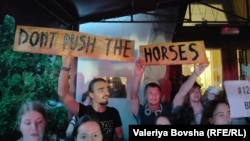Ukrainian lawmakers have approved a tightening of restrictions on two crucial anti-corruption agencies, heightening concerns over the country's commitment to rooting out deep-seated graft.
A total of 263 deputies in the 450-seat Verkhovna Rada voted in favor of a law that limits the independence of the National Anti-Corruption Bureau of Ukraine (NABU) and the Specialized Anticorruption Prosecutor's Office (SAPO).
The law, brought forward by President Volodymyr Zelenskyy's the Servant of the People Party, makes the Prosecutor-General the de facto head of SAPO, effectively stripping the agency's chief of their authority.
It also allows the Prosecutor-General to unilaterally close cases involving top officials and lets the Prosecutor General reassign cases being investigated by NABU to other agencies.
"With this decision, Parliament not only strips society of one of the greatest achievements since the Revolution of Dignity -- independent anti-corruption institutions -- but also undermines the trust of Ukraine’s international partners," Transparency International Ukraine said in a note after the approval.
"The only way to reverse the damage is for the President to veto the law. Otherwise, President Volodymyr Zelenskyy will share responsibility with the Verkhovna Rada for dismantling Ukraine’s anti-corruption infrastructure."
Demonstrators gathered in Kyiv, Dnipro, and other Ukrainian cities to protest against the bill.
The legal changes come on the heels of a crackdown on NABU itself.
On July 21, Ukraine’s domestic security agency, the SBU, arrested two NABU officials -- one on suspicion of spying for Russia, the other over alleged business ties to Russian entities -- and carried out dozens of searches targeting agency employees.
The SBU claimed some officials had connections to banned political groups, including a fugitive Ukrainian lawmaker’s former party.
NABU, which has led high-profile investigations that embarrassed senior officials, said the operation went far beyond legitimate security concerns, extending to unrelated issues such as years-old traffic violations. The agency warned that the scope of the crackdown had effectively paralyzed its mission.
Transparency International called the raids an example of “massive pressure” on Ukraine’s anti-corruption institutions.
The ambassadors of the Group of Seven nations in Kyiv, who met with NABU's leadership shortly afterward, issued a statement expressing “serious concerns” and said they would raise the matter directly with government leaders.
The latest moves have reignited broader fears that Ukraine’s deeply rooted problems with corruption are not being tackled, with efforts to promote accountability and transparency facing pushback from powerful vested interests.
Last week, Vitaliy Shabunin, one of Ukraine’s most prominent activists on corruption issues and the number 2 at NABU, was in court for allegedly systematically evading military service while claiming army pay worth $1,200 per month and illegally using a military vehicle.
Investigators said Shabunin could face up to 10 years in prison if convicted of the charges.
His supporters have called the charges "absurd," noting that he was absent from his unit because he was seconded to work at NABU, on an official government anti-corruption body.
"The case results from either the “complete incompetence of officials” or a “targeted attack aimed at putting pressure on Vitaliy Shabunin, who, while serving in the military, continued to criticize the work of state bodies," a statement by 59 Ukrainian non-governmental organizations issued on July 15 said.
Even a lawmaker from Zelenskyy’s own party, Anastasia Radina, described the case as a “selective miscarriage of justice.”
International perceptions of corruption in Ukraine are key to the country maintaining confidence from allies who have supported Kyiv in its war against invading Russian forces.
Corruption remains a persistent internal threat, illustrated by a series of scandals in recent years involving the Defense Ministry, national prosecutors, and wealthy businessmen.
Zelenskyy's landslide election victory in 2019 was widely seen as another push to try to move society beyond old habits: away from bribery and kickbacks -- big and small -- and toward transparency and accountability.
Russia's war has made it more difficult.
During the invasion, defense planners have been raked over the coals for several eye-popping procurement scandals.
Transparency International, whose corruption perception ratings are closely watched around the world, said Ukraine had improved markedly in recent years due to "reforms aimed at European integration and the fulfillment of international obligations."
However, the country slipped last year, the group said, because reforms have been "implemented only formally," or the implementation was "being deliberately stalled."
Overall, Ukraine rated in 105th place out of 180 countries in the organization's 2024 Corruption Perceptions Index -- ahead of Russia and Belarus but behind Moldova, Hungary, and Romania. The United States was in 28th place.











